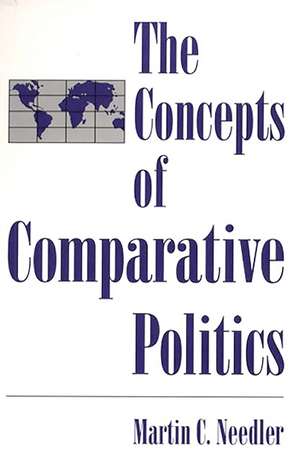The Concepts of Comparative Politics
Autor Martin Needleren Limba Engleză Hardback – 29 ian 1991 – vârsta până la 17 ani
Preț: 344.22 lei
Preț vechi: 475.42 lei
-28% Nou
Puncte Express: 516
Preț estimativ în valută:
65.87€ • 68.69$ • 54.75£
65.87€ • 68.69$ • 54.75£
Carte tipărită la comandă
Livrare economică 21 martie-04 aprilie
Preluare comenzi: 021 569.72.76
Specificații
ISBN-13: 9780275936525
ISBN-10: 027593652X
Pagini: 176
Dimensiuni: 140 x 216 x 14 mm
Greutate: 0.37 kg
Ediția:New.
Editura: Bloomsbury Publishing
Colecția Praeger
Locul publicării:New York, United States
ISBN-10: 027593652X
Pagini: 176
Dimensiuni: 140 x 216 x 14 mm
Greutate: 0.37 kg
Ediția:New.
Editura: Bloomsbury Publishing
Colecția Praeger
Locul publicării:New York, United States
Notă biografică
MARTIN C. NEEDLER is Dean of the School of International Studies at the University of the Pacific in Stockton, California. He is the author of a number of books and monographs, including Mexican Politics: The Containment of Conflict, 2nd Edition (Praeger Publishers, 1990).
Cuprins
IntroductionCrisis and DiscontinuityRevolutionTotalitarianism and DictatorshipLegitimacyDevelopmental PerspectivesPolitical DevelopmentPolitical Issues in Developmental PerspectiveMilitary Rule and the Single-Party System in the Third WorldPolitical InfrastructurePolitical CultureSocial Class and PoliticsThe Two-Party SystemPolitical InstitutionsPressure Groups, Bureaucrats, and PolicymakingExecutives, Legislatures and the Separation of PowersThe Parliamentary-Presidential HybridConclusionIdentity, Interest, IdeologyBibliographyIndex








